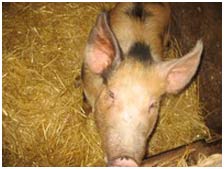Taiwan developed genetically modified pigs specializing in grass
Scientists from the National University of Taiwan (NTU) have developed genetically engineered pigs, which produce odorless and non-polluting animal manure.
About 30 genetically modified pigs were created by a group of scientists led by Professor Winston T. Cheng. Professor Cheng has worked on genetically modified pigs.
 To improve the growth of pigs, people often supplement phosphorus in their food. This substance is released in manure. This is the main factor causing pollution to increase the fertility of ponds and lakes. Researchers have in turn implanted two special enzymes for pigs, phytase, to help them absorb phosphorus in food and cellulase to digest cellulose.
To improve the growth of pigs, people often supplement phosphorus in their food. This substance is released in manure. This is the main factor causing pollution to increase the fertility of ponds and lakes. Researchers have in turn implanted two special enzymes for pigs, phytase, to help them absorb phosphorus in food and cellulase to digest cellulose.
These pigs have become herbivores, consuming only plants and plants. Thus, manure is odorless and contains very few pollutants. However, health officials have not announced whether these genetically modified pigs will be consumed.
Power
- Taiwan: Breeding genetically modified pigs for human organ transplantation
- China created mini genetically modified pigs, priced at 36 million / head
- Genetically modified plants still cause doubts
- Scary effects of genetically modified plants
- Genetically modified food in Vietnam ever since?
- Genetically modified salmon in the US is controversial
- Genetically modified bananas are about to be tested on Americans
- Things you should know about GMO genetically modified foods
- Genetically modified insects threaten genetically modified plants
- Using genetically modified foods is prone to cancer
- He called on the EU to approve genetically modified corn by voting
- Legislation of genetically modified corn harmful
 Animal 'suffering' after hibernation
Animal 'suffering' after hibernation Why do goats climb well?
Why do goats climb well? Scientists were surprised to see chimpanzees eating turtles
Scientists were surprised to see chimpanzees eating turtles Giant catfish died deadly due to drought in Thailand
Giant catfish died deadly due to drought in Thailand